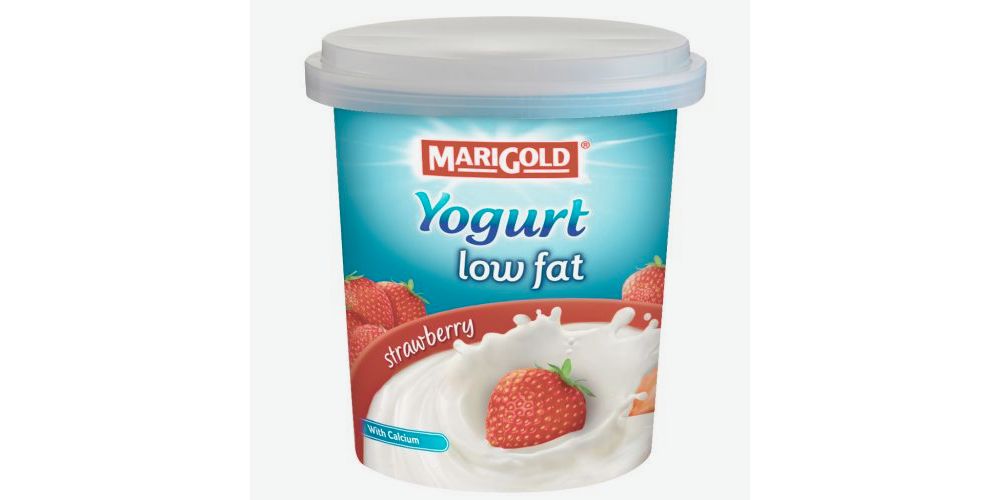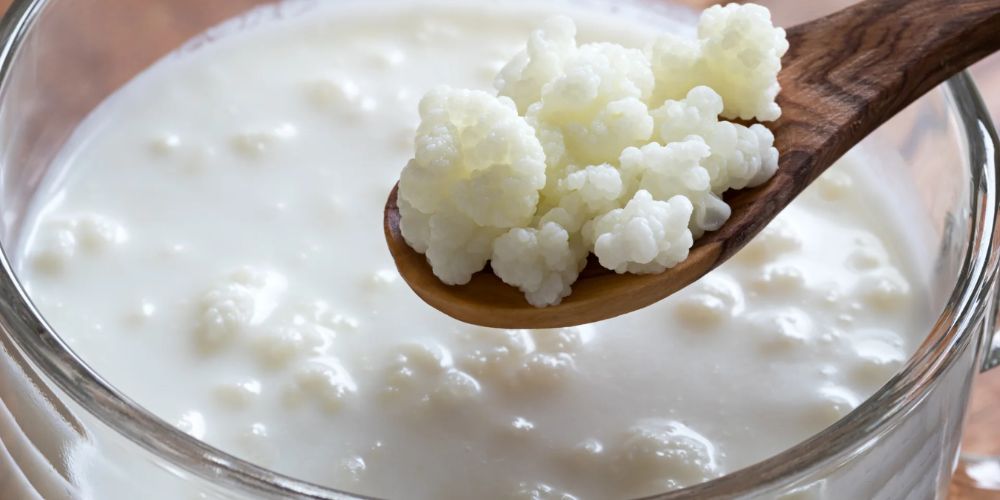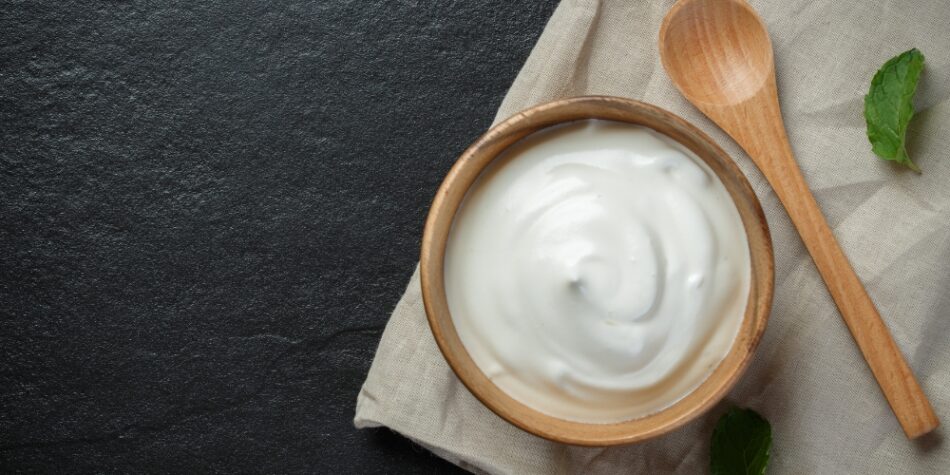A bacterial yogurt culture is used to ferment milk, creating yogurt, a dairy product. It offers calcium and protein and might improve good probiotic gut bacteria.
Depending on the type of yogurt taken, various health advantages include preventing osteoporosis, treating irritable bowel syndrome, and promoting digestion.
Fresh milk or cream is the basis for yogurt. It is frequently pasteurized first, then fermented with different live bacteria cultures, and incubated at a certain temperature to promote bacterial development.
The natural sugar found in milk, lactose, is fermented by the culture. Lactic acid is produced as a result, giving yogurt its unique flavor.
Some yogurt products can become unhealthy by processing and the addition of sugar.
There are numerous varieties of yogurt available that offer varied degrees of nutritional value.
When is yogurt healthy for you?
Depending on who is eating it and what kind of yogurt is being consumed, yogurt may or may not be a healthy decision.
Yogurts can be a good source of protein, calcium, vitamins, live cultures, and probiotics, which help improve the gut flora.
These may protect the bones and teeth and aid in preventing stomach issues.
On a plan to lose weight, low-fat yogurt can be a good source of protein.
The immune system might be strengthened by probiotics.
Although further research is required to support some of these assertions, some people contend that they may also affect how the brain functions.
According to studies from 2014, yogurt consumption may help prevent type 2 diabetes. The chance of having the illness did not seem to be impacted by other varieties of dairy products.
Other researchers contend that probiotic bacteria in yogurt effectively shield kids and pregnant women from the negative consequences of heavy metal exposure.
When people find it difficult to chew their meal, it is also a nourishing choice.
For those who cannot consume dairy or animal products due to allergies or sensitivities, there is an option in the form of non-dairy yogurt.
Lactose is consumed during the fermentation process in yogurt, making it less lactose-rich than milk.
When is yogurt unhealthy?
Yogurts are not always healthy. Those without extra sugar or unneeded additives can be a healthy addition to the diet, but some goods include a lot of added sugar and other components that may not be good for you.
Natural yogurt has a lot of protein and little calories.
However, many producers use unhealthy substances including sugar, artificial sweeteners, and other sweeteners.
Natural sugars are included in all yogurts to some extent, although buyers are encouraged to look for products with less than 15 grams of sugar per serving. As long as it doesn’t contain any artificial sweeteners, the less sugar the better.
Authorities have questioned whether health claims can be made for commercial purposes after several research challenged the idea that yogurt consumption is associated with good health. Yogurt eaters, however, are more likely to follow a generally healthy diet.
Products with a yogurt flavor
Yogurt powder is only slightly present in packaged goods such as cereals and bars that advertise that they are “made with real yogurt,” yogurt-covered raisins, and other products with a yogurt coating.
Heat is used to process yogurt powder, and heat destroys the good bacteria. Yogurt coatings are created from yogurt powder, whey, oil, sugar, and whey.
Types
There are many types of yogurt.
Low-fat or fat-free

Yogurt with less than 2% milk is referred to as low-fat or reduced-fat yogurt. Zero percent or skim milk is used to make non-fat yogurt.
Kefir

Kefir is a drinkable kind of yogurt. It is simple to produce at home by mixing milk with kefir grains and letting it stand for 12 to 24 hours. It contains probiotics.
Greek yoghurt

Greek yogurt is a rich, creamy food. It is frequently used in cooking and dips with a Mediterranean flair since it can resist heat better than regular yogurt.
To create it, normal yogurt is further strained to eliminate the liquid whey.
The thicker concentration produces a larger protein content, but the additional straining lowers the calcium amount.
Greek yogurt is offered in full-fat, reduced or low-fat, non-fat, and zero percent-fat varieties.
Skyr

Skyr, which is pronounced “skeer,” is an Icelandic-style yogurt that resembles Greek yogurt in that it is rich, creamy, and loaded with protein. Skyr contains 2 to 3 times more protein and requires 4 times as much milk to prepare as ordinary yogurt.
frozen yogurt

Many people consider frozen yogurts to be a healthier option to ice cream.
However, many frozen yogurts have at least as much sugar as normal ice cream.
Additionally, not all purported frozen yogurts include live and active cultures, according to the National Yogurt Association. Some people use heat-treated yogurts, which kill the live, active microorganisms.
Non-dairy yogurt

Soy yogurt and yogurt made with coconut milk are two non-dairy yogurt alternatives.
Benefits

Yogurt can provide a variety of crucial nutrients.
Probiotics
Some yogurts contain probiotics as an additive.
Probiotics are a sort of beneficial microorganisms for the gut. They aid in digestive system regulation and lessen gas, bloating, diarrhea, and constipation.
Probiotics may strengthen the immune system, assist in controlling weight, and lower the risk of developing cancer, according to some research.
Yogurt and other probiotic meals may improve the absorption of vitamins and minerals.
Streptococcus thermophiles and Lactobacillus bulgaricus are the two bacteria that are most frequently employed to ferment milk into yogurt, but many yogurts also contain other bacterial strains.
The National Yogurt Association introduced the Life & Active Cultures (LAC) seal, which can be found on the product container, to assist consumers in identifying yogurts containing live and active cultures.
Most of the time, a product will contain more live bacteria the fresher it is.
The benefits of various probiotics will vary, and some yogurts containing probiotics may be better than others, according to a recent study from the University of Toronto.
Calcium
In terms of bioavailability, dairy products are among the top dietary sources of calcium.
For the growth and maintenance of healthy teeth and bones, calcium is necessary. It is necessary for blood clotting, wound healing, and preserving normal blood pressure, among other things.
Vitamin D helps the small intestine absorb calcium, thus calcium-rich meals work best when combined with a vitamin D source.
Additionally, the majority of yogurts include variable levels of the vitamins B6 and B12, riboflavin, potassium, and magnesium.
lactose intolerance
A person with lactose intolerance will probably find yogurt to be more palatable than milk because yogurt has a low lactose level. Additionally, it contains digestive-helping microorganisms.
Because of this, many people may eat yogurt without experiencing any discomfort, bloating, or gas after drinking liquid milk or ice cream.
The person should test a small amount of yogurt—say, a quarter of a cup—to observe how their body responds. This only applies to people who are lactose intolerant; people who are allergic to milk are not affected.
Yogurt can be a crucial part of the diet of those who are lactose intolerant since they frequently lack calcium.
Yogurt won’t be beneficial for someone who is allergic to milk.
Diet
Here are some ideas for including more yogurt in a balanced, healthy diet.
Start with plain, unsweetened yogurt and add fruit, unsweetened applesauce, or a little bit of pure maple syrup or honey to taste.
Desserts made with fruit and yogurt that are already prepared should be avoided because they frequently have extra sugar added without need.
Yogurt can be used for butter or oil in baking.
For tacos or baked potatoes, use plain Greek yogurt instead of sour cream.
A yogurt that is good for you should include more protein per serving than sugar.








